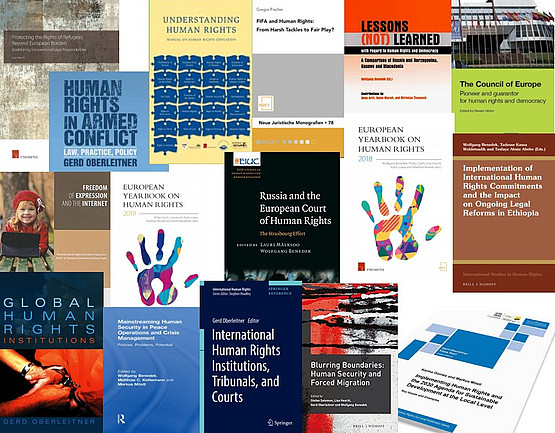Research Areas Overview

The European Training and Research Centre for Human Rights and Democracy (UNI-ETC) and the UNESCO Chair in Human Rights and Human Security, together with next-generation researchers in the interdisciplinary Doctoral Programme on Human Rights, Democracy, Diversity and Gender, engage in research on the protection and promotion of human rights, including at the local and regional level, and on human security. Our areas of interest are:
Implementing human rights in Europe
The UNI-ETC co-edits the European Yearbook on Human Rights which traces human rights developments in the Council of Europe, the European Union and the OSCE. The UNESCO Chair is senior researcher in FRANET, the European Fundamental Rights Agency’s multidisciplinary research network. Recent publications include W. Benedek, Russia and the European Court of Human Rights (CUP 2018). In 2021, Wolfgang Benedek served as Rapporteur in the OSCE’s Moscow Mechanism on the human rights situation in Belarus.
Human rights, conflict and security
The UNI-ETC and Chair investigate the role of human rights and armed conflicts, the linkages between human rights and human security, the intersection of human rights and humanitarian law as well as the role of non-state armed actors in conflict and security. Publications include G. Oberleitner, Research Handbook on International Law and Human Security (Edward Elgar, forthcoming).
Migration, asylum and refugee law
The UNI-ETC is active in teaching and research in the area of migration, asylum and refugee law and publishes on migration and asylum issues in Europe. Recent publications include L. Heschl, Protecting the Rights of Refugees Beyond European Borders: Establishing Extraterritorial Legal Responsibilities (Intersentia, 2018). The UNI-ETC’s refugee law clinic allows student to engage with practitioners of the Austrian asylum system and gain insight into the Common European Asylum System. Erasmus+ projects promote migration studies in higher education with Afghanistan, Armenia, Azerbaijan and Georgia, including a winter school on migration in New Delhi in 2020.
Digital human rights
Human rights online, digital freedom of expression and hate speech on the internet are areas of interest. The research project NoHate@WebStyria analyses incitement to violence, insults based on ethnic origin, gender or sexual orientation, and Holocaust denial in local (Styrian) media and develops counterstrategies, policy recommendations and contributes to awareness raising. The UNI-ETC is a partner in the EU/COST activity ‘Global Digital Human Rights Network’. Recent publications include the updated and revised 2nd edition of W. Benedek and M.C. Kettemann, Freedom of Expression and the Internet (Council of Europe 2020)
Human rights go local
In cooperation with the International Centre for the Promotion of Human Rights at the Local and Regional Levels under the auspices of UNESCO in Graz, UNI-ETC and Chair co-edit the publication series Human Rights Go Local. It allows established researchers, new voices, and practitioners to analyse the interlinkages between human rights and global policy frameworks such as the SDGs and the New Urban Agenda and to showcase practical ways to create inclusive, resilient, safe and sustainable cities based on human rights. The UNI-ETC and UNESCO Chair co-organise the annual Academy and Conference ‘Human Rights at the Local Level: What Works’. The UNESCO Chair has contributed to the study of the International Law Association on the ‘Global City’ and to the 2020 World Urban Forum. Recent publications include G. Oberleitner / K. Starl, Understanding Human Rights at the Local Level, in A. Brysk / M. Stohl (eds), A Research Agenda for Human Rights, Edward Elgar 2020).
Human rights education for inclusion
The UNI-ETC and Chair cooperate on human rights education and inclusion with partners such as the University of Prishtina (HERAS University Education for Intercultural Understanding and Peacebuilding), the University of Addis Ababa and the Ethiopian Civil Service University (Advanced Academic Partnership for Legal and Human Rights Education), and partners in Armenia and Bosnia and Herzegovina (Development and Implementation of Social Dimension Strategies in Armenia and Bosnia and Herzegovina through Cross-Regional Peer Learning). The research project “SmatchS: Sports Organizations Matching Social Inclusion Issues” is an initiative of six organizations from sport, social and academic areas, to encourage social inclusion and equal opportunities of children with a migratory background in and through sport. Recent publications on human rights education include G. Oberleitner, Challenges and Opportunities for Human Rights Education, in UNESCO (ed.), Humanistic Futures of Learning - Perspectives from UNESCO Chairs and UNITWIN Networks (UNESCO 2020).